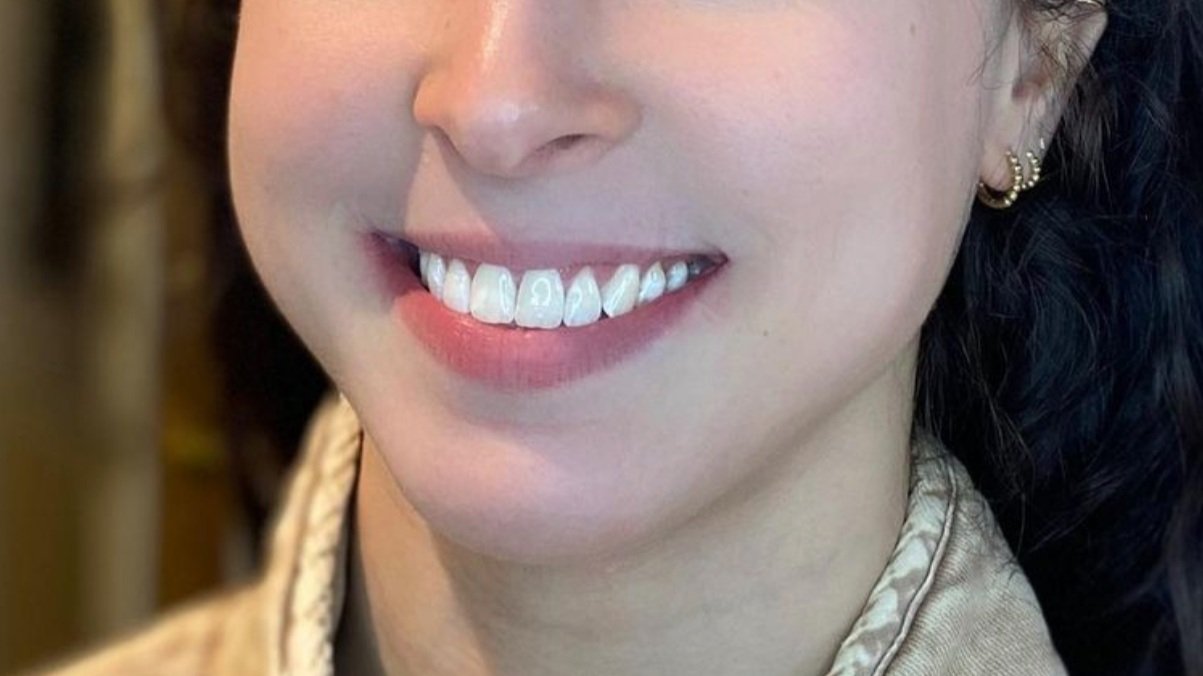TOOTH WHITENING
TOOTH WHITENING
APPOINTMENT ONLY
Teeth whitening is a simple process. Our whitening products contain 16% hydrogen peroxide that can lighten your teeth up to 3-8 shades lighter.
The solution works by breaking stains into smaller pieces, which makes the color less concentrated and your teeth brighter.
30-Minute Express ✦ $150
1-Hour Whitening ✦ $275




Tooth Whitening Aftercare
-
Following a teeth-whitening procedure, the first 48 hours are the most crucial to the teeth because they are more prone to blemishes at this time.
If you want the best results and prolong your teeth whiteness, you must avoid eating deep-colored meals and using tobacco.
Items to avoid include wine, tea, coffee, cherries, chocolate, beets, all kinds of berries and dark sauces.
-
As part of your aftercare routine, you should avoid soda, pickles, lemons, pickles, limes and other foods or drinks containing acids.
The teeth whitening treatment weakens the tubules, or pores, of teeth enamel and opens them up.
The weakening of the enamel makes your teeth prone to stains and decay after whitening, and the acid further worsens the weakness.
-
Your teeth will be sensitive after the whitening procedure. You should generally avoid meals that are either too hot or too cold. Buying toothpaste designed especially for sensitive teeth will help to reduce potential discomfort.
It is advisable to avoid eating the wrong foods or drinks as much as possible. If the items have nutritional benefits, you can consume them, but you must rinse your teeth afterward or brush them. If brushing is not an immediate option, keep sugar-free gum handy to keep your teeth free of decay and prevent staining.
-
48 hours after the procedure, you can preserve teeth whiteness by eating these foods as part of aftercare.
Certain meals help to clean and brush your teeth while eating, thus ensuring they remain white.
Such meals include crunchy fruits or vegetables, especially apples, celery, carrots and green beans. They enhance the production and flow of saliva. Increased saliva helps clean the teeth and counteract the acids. The crunchy vegetables can remove temporary stains before they stick.
However, if the fruit or vegetable is darkly colored, do not forget to wash your mouth with water afterward so that the colors will not stain your teeth.
To complement the fruits and vegetables, you should also increase your intake of dairy products and high-calcium meals.
The nutrients and minerals in these meals will keep your teeth healthy and will defend against decay.
FAQS
-
Yes, I only work with individuals 18-years old or older. Please be ready to present a valid ID at the time of your service! New York law prevents me from working on minors under any circumstances, including with a guardian present.
-
We do not accept walk-ins for tooth whitening. We do allow you to book as little as 48-hours in advance, though, if there is availability.
-
Teeth whitening lasts longest when patients follow a healthy diet, avoid smoking, avoid teeth staining foods and drinks, utilize a straw when possible, and maintain regular dental cleanings.
Depending on the type of teeth whitening procedure, your teeth should retain their whiteness for at least a year or more with proper dental care.
-
Stains on teeth appear when colored molecules stick to the plaque, tartar, and the surface of our teeth. Dental cleanings help remove plaque and tartar, but sometimes the stains still appear in the layer below called the dentin. The bleaching solution applied to the teeth combines with oxygen from the air and carbon in the dentin to break apart the staining molecules stuck on the teeth.
-
Results from whitening vary from person to person and on the type of stains. Teeth whitening generally works best on yellowish-brown stains compared to gray stains.
-
Teeth whitening works best on teeth free of plaque and tartar. Staying current on your dental cleanings is important for your health, but will also ensure the best possible results for whitening. If you are due for a cleaning, you can schedule the dental cleaning and the teeth whitening on the same day. The cleaning should be complete before the teeth whitening.
-
Teeth whitening can cause sensitivity to the teeth and gums. Some patients experience little to no sensitivity, while other patients may need to limit the strength and time of the bleaching to avoid sensitivity. Speak to your dentist about ways to avoid sensitivity and always have the procedure performed by a licensed professional.
Your dentist may recommend a special toothpaste to use prior to and after the procedure, as well as suggest only certain types of whitening. If you do experience sensitivity after treatment, an OTC pain reliever can usually help to reduce the symptoms.
-
There is nothing special you need to do before whitening, however, the treatment does work best on healthy teeth free of plaque and tartar.
-
Whitening does not change the color/shade of dental veneers or any non-natural tooth restoration.
-
Whitening does not change the color/shade of dental bonding/composite or any non-natural tooth restoration.
-
Whitening does not change the color/shade of dental crowns/bridges or any non-natural tooth restoration.
